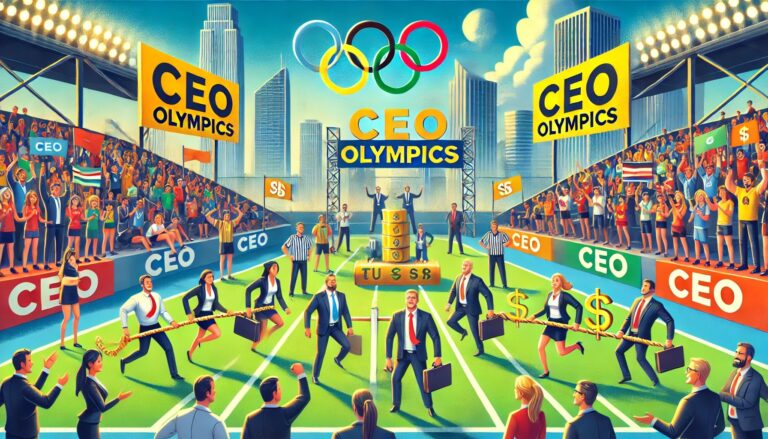It is a common misconception that competitive markets produce efficient outcomes. competition Although competition can encourage increased effort, it is not necessary that this effort be directed toward something productive. Increased competition also has a dark side: it tends to produce unnecessary duplication and waste. The idea that competition can be problematic rather than effective is an idea sometimes associated with the investor today. Peter ThielBut in reality, this view is not new. In fact, the idea that competition is wasteful revives a criticism formulated by economists more than a century ago.
Thorstein Veblen argued In 1899, Veblen wrote that competition is motivated by basic human instincts such as “ferocity and cunning.” For Veblen, “modern competition is largely a process of self-affirmation based on these traits of predatory human nature.” Predatory traits may benefit the individual who wins the competitive race, but they often do not directly advance the interests of the community as a whole. Veblen saw competitive motivation as stemming from the fear of losing self-esteem if one fails to excel in socially valued endeavors. Thus, competition is largely fueled by the pursuit of peer esteem.
Joseph Schumpeter Also wrote In 1942, “in capitalist reality, as opposed to the image we have in textbooks, it is not competition (by price) that counts, but the competition of the new product, the new technology, the new source of supply, the new type of organization.” In other words, what counts for economic progress is not competition along a narrow dimension such as price or the number of firms, but rather the abundance of different organizational structures, products and innovations that should be the focus of concern.
Veblen’s point is perhaps closer to what we think of when we hear a phrase like “wasteful competition.” Imagine two executives who are roughly equally qualified competing for a promotion to CEO at the same company. They spend a tremendous amount of time and effort outdoing each other, when in reality only one of them can get the job. In a sense, the unsuccessful candidate’s efforts were for naught in this winner-take-all scenario. Employee competition for promotions is a lot like corporate lobbying for government favors in a zero-sum rent-seeking game. The runner-up would probably have been better off using his talents elsewhere, in a more specialized role that would create value.
As FA Hayek It is worth noting that competition is useful as a “discovery procedure“to reveal knowledge about the best candidates, products, and business models. But his argument may be overstated. Perhaps the key to unlocking knowledge about the best methods and candidates is simply to have a diversity of experiences and approaches, rather than having multiple companies or employees imitating each other’s strategies in a crowded market space. Differentiation and specialization can therefore result in “discovery procedures” that are just as good, or even better, than the competition.
Anecdotally, I have found that I produce some of my best work when I focus on under-covered topics for which there is high demand but low supply due to low competition. For example, I have had success researching regulatory reform topics in US states. Working on a niche topic like this and developing a comparative advantage It simply follows from the principle of division of labor. If there had been many competitors working on these issues, I doubt that my work would have been as remarkable or as effective.
In theory, a perfectly efficient economy might be characterized by “perfect specialization,” in which every person and every firm is a monopoly in his or her own unique role. Competition still has a role to play in stimulating efforts to overcome apathy, but it may not be as great a role as the one students read about in economics textbooks. Competition is downright inefficient when it encourages layoffs that come at the expense of creating distinctive value added for oneself or one’s firm. In this view, a perfectly efficient economy might be characterized by “perfect specialization,” in which every person and every firm is a monopoly in its own unique role. monopoly is not so problematic if it is built on genuine uniqueness rather than barriers to entry.
Another source of unnecessary competition is the academic arms race to get into elite universities. Students compete in extracurricular activities like SAT prep, sports, and club memberships. But taken to an extreme, it becomes a unproductive signaling game It’s about proving that you’ve jumped more hurdles than the next candidate. Again, some competition is healthy to provide motivation and reveal merit. But the competitive process can quickly reach a point of diminishing returns if students engage in activities to pad their resumes rather than to create real value and develop human capital.
In general, competition has a valuable utility when it motivates individuals to be productive when they would not otherwise be motivated by themselves. But preferably, individuals pursue excellence because they want to, not because they are forced to. In an ideally efficient economy, each individual could then be endowed with “perfect preferences” and constitute an autonomous monopoly, propelled by his own will to create value for others. As Schumpeter would have wished, competition would then be one of the best ideas, rather than one of the most relentless tactics.
In conclusion, economists should not view competition as an unalloyed good. They should take seriously the risk that competition generates waste and zero-sum power games, limiting output and innovation rather than the other way around. The sweet spot might be minimal competition to encourage effort, combined with strong intrinsic incentives and a high degree of specialization and experimentation. Overall, a world with fierce competition at all levels has significant drawbacks relative to a world where people strive to excel in their own way.
James Broughel is a Senior Fellow at the Competitive Enterprise Institute focusing on innovation and dynamism.


